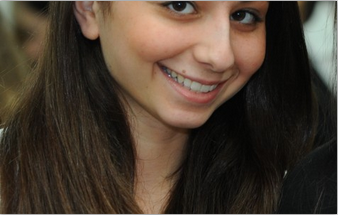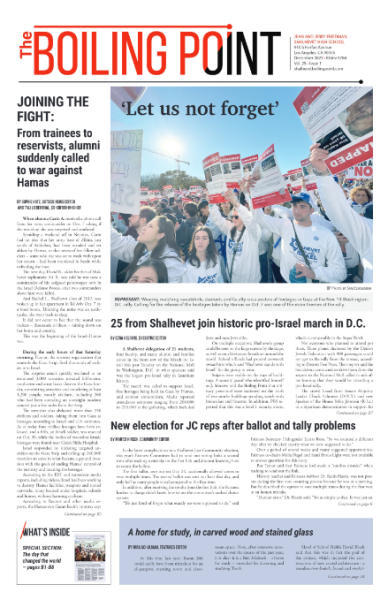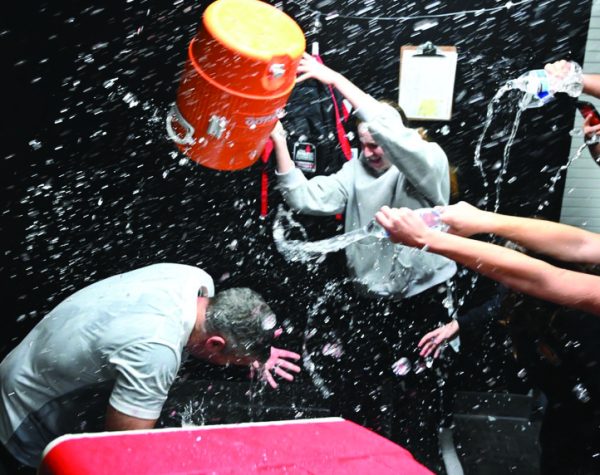Where food comes from, where it should

ETHICAL EATING: Rose Lict, left, Justin Goldstein, center, and Rabbi Shmuly Yanklowitz, right, answer student questions about Judaism’s relationship with food, Feb. 17.
March 14, 2011
Hunger, food safety and Jewish laws regarding food ethics were the subject when Town Hall was turned into an assembly Feb. 17. Experts from three Jewish organizations came to bring awareness to students in hopes that Shalhevet would take an active role in their programs.
Spokesmen for Mazon, Hazon and Uri L’tzedek answered questions, and Shalhevet alumna Amanda Gelb ’05, who is Uri L’tzedek’s Los Angeles director of community education, organized and moderated the program.
“The social issues surrounding food, like food safety, are things I was never exposed to and never stopped to think about when I was at Shalhevet,” Amanda told Town Hall.
“My hope was that in being exposed to some of these issues through the panel, Shalhevet students could start their awareness of these important issues.”
The assembly began with a video made by junior Yonah Nimmer of Shalhevet students eating. Judaic Studies teacher Raizie Weissman was filmed interviewing students around the school, asking if they knew where their food came from. Almost all the responses drew laughter.
In the video, junior Deanna Grunfeld was introduced as one of Shalhevet’s brightest students, and then asked if she knew where the lunch she was eating had come from.
“Well, this is chicken, so — a cow,” Deanna said, before quickly realizing her mistake. The audience roared.
Senior Jenny Newman was the only student who answered with a definitive yes, noting the coffee beans in her Starbucks drink were from a sustainable plantation, because all of Starbucks’ coffee is classified Fair Trade. (See related story, Page x.)
The rest of the assembly took a more serious tone. Some juniors and seniors had prepared for the program in Talmudic Jurisprudence and Jewish Philosophy where they created an ethical guide for restaurants to follow. They also wrote the questions they had for the panelists.
Amanda read the questions, which ranged from “What places do you help the most?” to “What recent success have you had?” Then, Amanda opened the floor to audience questions.
“I was certainly ignorant about all the activism being done in Judaism’s name, and I bet some of the students were as well,” Judaic Studies teacher Rabbi Feinerman said. “I think the fact that Orthodox Jews are involved is great, and I think it is good that we are helping the non-Jews as well.
Uri L’tzedek was represented at the assembly by its founder, Rabbi Shumly Yanklowitz of UCLA Hillel. It is an Orthodox social justice organization whose mission is to create a more just world through education, leadership development, and action.
A big project of theirs is the Tav HaYosher, an “ethical kashrut” certification that aims to bring workers, restaurant owners and the community together to create moral kosher restaurants. Tav HaYosher seals go to restaurants that follow the ethical standards.
Very new on the West Coast, Tav HaYosher seals are now in place at Shwarma Palace, Le Shack Bistro, and The Coffee Bean and Tea Leaf: Hillel at UCLA. Shalhevet is in the process of applying, Rabbi Yanklowitz said.
Mazon, represented by West Coast project coordinator Rose Lict, distributes donations to more than 300 hunger relief agencies.
Hazon, represented by Justin Goldstein, said his group wanted people to change their food habits. They hold regular bike rides and conferences, in keeping with their vision to “create healthy and sustainable communities in the Jewish world and beyond.”
“I hoped this assembly wouldn’t be something students just forgot about,” Amanda said when the program was over. “I hope that people will contact the organizations to find out more and get involved.”
Agenda Chair Toby Bern said the program was not arranged by the Agenda Committee.













